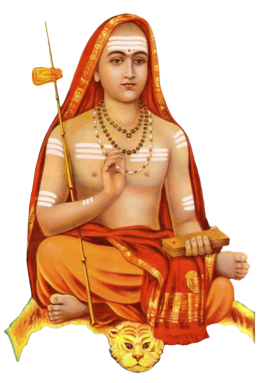ब्रह्मण्यनन्तेऽप्यणुमात्रभेदम् ।
पश्यत्यथामुष्य भयं तदैव
यद्वीक्षितं भिन्नतया प्रमादात् ॥ ३३0 ॥
brahmaṇyanante’pyaṇumātrabhedam |
paśyatyathāmuṣya bhayaṃ tadaiva
yadvīkṣitaṃ bhinnatayā pramādāt || 330 ||
दृश्येऽत्र यः स्वात्ममतिं करोति ।
उपैति दुःखोपरि दुःखजातं
निषिद्धकर्ता स मलिम्लुचो यथा ॥ ३३१ ॥
dṛśye’tra yaḥ svātmamatiṃ karoti |
upaiti duḥkhopari duḥkhajātaṃ
niṣiddhakartā sa malimluco yathā || 331 ||
महत्त्वमात्मीयमुपैति नित्यम् ।
मिथ्याभिसन्धानरतस्तु नश्येद्
दृष्टं तदेतद्यदचौरचौरयोः ॥ ३३२ ॥
mahattvamātmīyamupaiti nityam |
mithyābhisandhānaratastu naśyed
dṛṣṭaṃ tadetadyadacauracaurayoḥ || 332 ||
his hand. If his hand was not burnt, it was a proof that he was innocent, but if it was burnt, he would be convicted and subjected to the usual punishments. The Chhandogya Upanishad VI. xvi. makes use of such a parable, to which the present Sloka refers.
स्वयमायामहमस्मीत्यात्मदृष्ट्यैव तिष्ठेत् ।
सुखयति ननु निष्ठा ब्रह्मणि स्वानुभूत्या
हरति परमविद्याकार्यदुःखं प्रतीतम् ॥ ३३३ ॥
svayaMāyāmahamasmītyātmadṛṣṭyaiva tiṣṭhet |
sukhayati nanu niṣṭhā brahmaṇi svānubhūtyā
harati paramavidyākāryaduḥkhaṃ pratītam || 333 ||
दुर्वासनामेव ततस्ततोऽधिकाम् ।
ज्ञात्वा विवेकैः परिहृत्य बाह्यं
स्वात्मानुसन्धिं विदधीत नित्यम् ॥ ३३४ ॥
durvāsanāmeva tatastato’dhikām |
jñātvā vivekaiḥ parihṛtya bāhyaṃ
svātmānusandhiṃ vidadhīta nityam || 334 ||
मनःप्रसादे परमात्मदर्शनम् ।
तस्मिन्सुदृष्टे भवबन्धनाशो
बहिर्निरोधः पदवी विमुक्तेः ॥ ३३५ ॥
manaḥprasāde paramātmadarśanam |
tasminsudṛṣṭe bhavabandhanāśo
bahirnirodhaḥ padavī vimukteḥ || 335 ||
श्रुतिप्रमाणः परमार्थदर्शी ।
जानन्हि कुर्यादसतोऽवलम्बं
स्वपातहेतोः शिशुवन्मुमुक्षुः ॥ ३३६ ॥
śrutipramāṇaḥ paramārthadarśī |
jānanhi kuryādasato’valambaṃ
svapātahetoḥ śiśuvanmumukṣuḥ || 336 ||
मुक्तस्य देहाद्यभिमत्यभावः ।
सुप्तस्य नो जागरणं न जाग्रतः
स्वप्नस्तयोर्भिन्नगुणाश्रयत्वात् ॥ ३३७ ॥
muktasya dehādyabhimatyabhāvaḥ |
suptasya no jāgaraṇaṃ na jāgrataḥ
svapnastayorbhinnaguṇāśrayatvāt || 337 ||
ज्ञात्वात्मनाधारतया विलोक्य ।
त्यक्ताखिलोपाधिरखण्डरूपः
पूर्णात्मना यः स्थित एष मुक्तः ॥ ३३८ ॥
jñātvātmanādhāratayā vilokya |
tyaktākhilopādhirakhaṇḍarūpaḥ
pūrṇātmanā yaḥ sthita eṣa muktaḥ || 338 ||
Vivekachudamani – Introduction
1: Devoted Dedication
2: Glory of Spiritual Life
3: Unique Graces in Life
4-7: Miseries of The Unspiritual Man
8-13: Means of Wisdom
14-17: The Fit Student
18-30: The Four Qualifications
31: Bhakti – Firm and Deep
32-40: Courtesy of Approach and Questioning
41-47: Loving Advice of the Guru
48-49: Questions of the Disciple
50: Intelligent Disciple – Appreciated
51-55: Glory of Self-Effort
56-61: Knowledge of the Self-Its Beauty
62-66: Direct Experience – Liberation
67-71: Discussion on Questions Raised
72-75: Gross Body
76-82: Sense Objects a Trap – Man Bound
83-86: Fascination for Body Criticised
87-91: Gross Body Condemned
92: Organs of Perception and Action
93-94: Inner Instruments
95: The Five Pranas
96-101: Subtle Body – Effects
102: Functions of Prāna
103-105: Ego Discussed
106-107: Infinite Love – the Self
108-110: Māyā – Pointed Out
111-112: Rajoguņa – Nature and Effects
113-116: Tamoguņa – Nature and Effects
117-119: Sattvaguņa – Nature and Effects
120-121: The Causal Body – Its Nature
122-123: Not-Self – Description
124-135: The Self – Its Nature
136: Advice for Self-control
137-142: What is Bondage – The Reply
143-144: The Powers – Agitation and Veiling
145-146: Bondage in Action
147-153: Ātman and Anātman – Discrimination
Negation of the Kośas
154-164: – Annamaya kośa (Food sheath)
165-166: – Prņamaya kośa (Vital air sheath)
167-183: – Manomaya kosa (Mental sheath)
184-188: – Vijnanamaya kośa (Intellectual sheath)
189-191: Ātman – Unattached
192-193: What is Liberation? – Disciple
194-206: Self-Knowledge gives Liberation
207-210: Anandamaya kośa (Bliss sheath)
211: Ātman – Other than the Five Kośas
212: What is Ātman? – Disciple
213-225: Nature of the Self – Discussion
226-236: All Manifestation Absolute
237-240: Brahman – Its Nature
241-249: That Thou Art – Explanation
250-253: Attitude in Meditation
254-266: Aids to Meditation
267-276: Give up Vāsanās – the Method
277-292: End Superimposition – The Means
293-297: The Perceived I’ Factor – False
298-309: Condemnation of the Ego
310-319: Actions, Thoughts and Vāsanās – Renounce
320-329: Total Vigilance – Its Price
330-338: In the One, No Plurality
339-348: Spiritual Growth – the Secret
349-353: Cause-Effect – False
354-372: Samadhi – Its Nature
373-378: Fully Detached – Samadhi Easy
379-383: Meditation – the Technique
384-397: Continuous Attention to Self
398-406: No Diversity in Reality
407-413: Ātma-vicāra – Contemplation
414-418: Give up Perceptions
419-425: The Science of Reality – Its Benefits
426-445: Signs of a Realised Seer
446-464: Prārabdha for a Saint
465-471: There is No Plurality
472-479: Experience of Selfhood
480-520: Practice of Knowledge – Disciple
521-575: Final Words of Advice
576-578: Blessed Disciple Liberated
579-581: The Glory of the Textbook

Vivekachudamani – Verses 330-338 – Vivekachudamani Verses 330-338 – By Adi Sankaracharya – In Sanskrit with English Meaning, Transliteration, Translation, Commenary, Lyrics, Audio – Vivekachudamani-330-338
